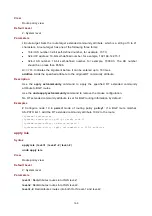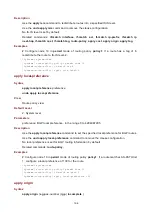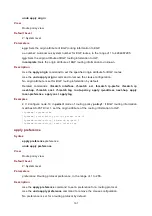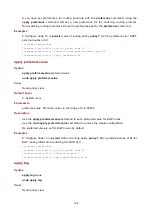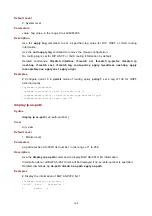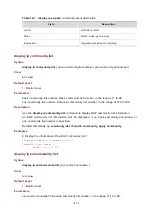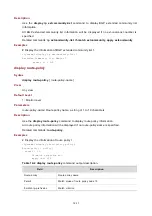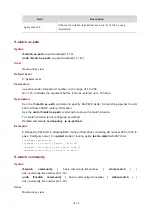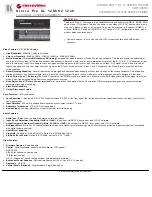
12-19
permit
: Specifies the match mode for the extended community list as permit.
rt route-target
: Specifies the route target extended community attribute, which is a string of 3 to
21 characters. A
route-target
has three forms:
z
A 16-bit AS number: a 32-bit self-defined number, for example, 101:3;
z
A 32-bit IP address: a 16-bit self-defined number, for example, 192.168.122.15:1.
z
A 32-bit AS number: 16-bit self-defined number, for example, 70000:3. The AS number
should be no less than 65536.
&<1-16>
: Indicates the argument before it can be entered up to 16 times.
Description
Use the
ip extcommunity-list
to define an extended community list entry.
Use the
undo ip extcommunity-list
command to remove an extended community list.
No extended community list is defined by default.
Examples
# Define extended community list 1 to permit routing information with RT 200:200.
<Sysname> system-view
[Sysname] ip extcommunity-list 1 permit rt 200:200
route-policy
Syntax
route-policy
route-policy-name
{
deny
|
permit
}
node
node-number
undo route-policy
route-policy-name
[
deny
|
permit
] [
node
node-number
]
View
System view
Default Level
2: System level
Parameters
route-policy-name
: Route policy name, a string of 1 to 19 characters.
deny
: Specifies the match mode of the route policy node as deny. If a route satisfies all the
if-match clauses of the node, it cannot pass the node and will not go to the next node.
permit
: Specifies the match mode of the route policy node as permit. If a route satisfies all the
if-match clauses of the node, it passes the node and then is executed with the apply clauses of
the node. If not, it goes to the next node of the route policy.
node node-number
: Node number,
in the range 0 to 65535. A node with a smaller number is
matched first.
Description
Use the
route-policy
command to create a route policy and a node of it and enter route policy
view.
Use the
undo route-policy
command to remove a route policy or a node of it.
No route policy is created by default.

